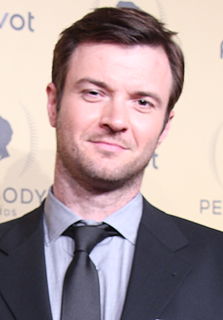A Quote by Aaron Sorkin
Humans know when it's not a good story. Unless you do this for a living, you may not know exactly why you don't like a story, but you can't fool an audience ever. They know when you have it and they know when you don't.
Related Quotes
The Universe story is the quintessence of reality. We perceive the story. We put it in our language, the birds put it in theirs, and the trees put it in theirs. We can read the story of the Universe in the trees. Everything tells the story of the Universe. The winds tell the story, literally, not just imaginatively. The story has its imprint everywhere, and that is why it is so important to know the story. If you do not know the story, in a sense you do not know yourself; you do not know anything.
[Eugene Smith] was always writing these diatribes about truth, and how he wanted to tell the truth, the truth, the truth. It was a real rebel position. It was kind of like a teenager's position: why can't things be like they should be? Why can't I do what I want? I latched on to that philosophy. One day I snapped, hey, you know, I know a story that no one's ever told, never seen, and I've lived it. It's my own story and my friends' story.
The biggest threat to your creativity is the fear that it's already been done, said, created. (So why bother?)
Say it, do it, make it anyway - but tell YOUR story along the way.
The story of how you came to know what you know.
The story of what you want to know more of.
The story of why you do what you do.
The story of how you came to care.
And that's how you create what's never been created before.
I myself, as I'm writing, don't know who did it. The readers and I are on the same ground. When I start to write a story, I don't know the conclusion at all and I don't know what's going to happen next. If there is a murder case as the first thing, I don't know who the killer is. I write the book because I would like to find out. If I know who the killer is, there's no purpose to writing the story.
You see people, you judge. It's just the human thing to do - good or bad, it's a fact. Like when you get a coffee at Starbucks and the person is rude to you. My mom always says, 'Yeah, but you don't know what kind of day they're having.' You don't know the back-story, and that's why it's so fun to be an actor and to get into the back-story.
And questions give us no rest. We know not why our curse makes us seek we know not what, ever and ever. But we cannot resist it. It whispers to us that there are great things on this earth of ours, and that we can know them if we try, and that we must know them. We ask, why must we know, but it has no answer to give us. We must know that we may know.
We cannot distinguish truth from falsehood, right from wrong, or know what obedience we owe to the magistrate, or what we may justly expect from him, unless we know what he is, why he is, and by whom he is made to be what he is.... I cannot know how to obey unless I know in what, and to whom; nor in what unless I know what ought to be commanded; nor what ought to be commanded unless I understand the original right of the commander, which is the great arcanum.
When we're in the story, when we're part of it, we can't know the outcome. It's only later that we think we can see what the story was. But do we ever really know? And does anybody else, perhaps, coming along a little later, does anybody else really care? ... History is written by the survivors, but what is that history? That's the point I was trying to make just now. We don't know what the story is when we're in it, and even after we tell it we're not sure. Because the story doesn't end.
Letting there be room for not knowing is the most important thing of all. When there's a big disappointment, we don't know if that's the end of the story. It may just be the beginning of a great adventure. Life is like that. We don't know anything. We call something bad; we call it good. But really we just don't know.




































